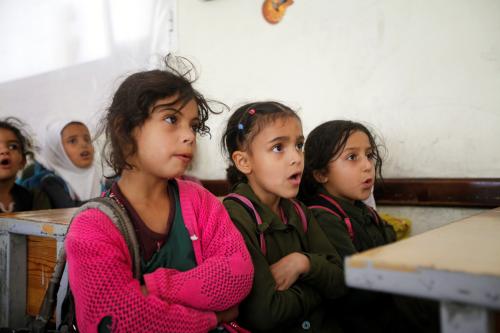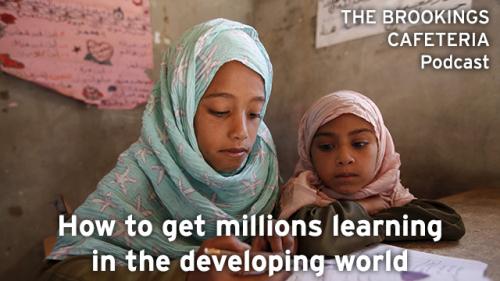The launch of the World Bank’s 2018 World Development Report (WDR) this week marked an important moment, as for the first time, the WDR, an annual blockbuster that dives deep into a major sector or challenge of importance to the development community, is on education. Shining a spotlight on today’s global learning crisis is critical not only to advancing progress in achieving education for all, but also to realizing all of the Sustainable Development Goals, since education plays an essential role in advancing economic development, poverty alleviation, and well-being more broadly. As our colleague Urvashi Sahni has said, education is important in its own right as well as for all the other “developmental and economic goodies” that it brings.
At an education and learning for a changing world event on October 4 at Brookings, Halsey Rogers, co-author of the report, underscored how the WDR serves as a megaphone for the urgency of the learning crisis both within and across countries. Most importantly, Rogers stressed that the report aims to broadcast this message beyond the proverbial choir, including to finance ministers.
Beyond just a call to arms, however, the new report lays out a set of concrete policy prescriptions to help countries more rapidly accelerate improvements in education. The WDR offers three policy actions to address the current learning crisis:
- Assess learning to make it a serious goal.
- Act on evidence to make schools work for all learners.
- Align actors to make the whole system work for learning.
These recommendations are music to our ears, as we have spent the past several years at the Center for Universal Education (CUE) working with many partners and colleagues to understand how to achieve this. The first phase of the Millions Learning project addressed the question of how to scale quality education for all children and youth. In alignment with the WDR policy prescriptions, the Millions Learning report called for more and better data around children’s learning at all levels to motivate, inform, and sustain action. The report also suggested ways for decision-makers to identify and evaluate evidenced-based practices that could be adapted and scaled in a new context.
But most exciting to us was recommendation three, which closely aligns with our vision for the next phase of the project. In this second phase of Millions Learning, CUE plans to launch Real-time Scaling Labs in partnership with local institutions in a number of countries that will focus on generating more evidence and practical recommendations around the process of scaling in global education, encouraging a stronger link between research and practice.
Through ongoing research and consultations, we have identified a set of core principles for the Real-time Scaling Labs that closely reflect the WDR’s call to align actors to make the whole system work for learning.
Mobilize everyone who has a stake in education
Improving education at large scale, and particularly for the most difficult to reach, requires bringing together a wide range of actors. This certainly involves the traditional actors within the education system—ministry of education officials, district education officers, teachers, parents, school leaders—but as the WDR argues, it also includes, “mobilizing everyone who has a stake in education,” including actors from other sectors, such as health, nutrition, and economic development; social enterprise, civil society, private sector, academia, and others. Governments play a pivotal role in this ecosystem. Not only is it their responsibility to deliver on every child’s right to a quality education, they should also actively foster an environment where all actors can effectively contribute their expertise and leverage all assets they bring.
The Real-time Scaling Labs are premised on a multi-stakeholder, systems-approach, bringing together a diverse set of stakeholders—including both policymakers and practitioners—around a particular education initiative that is scaling in order to learn from the process in real-time and make course corrections throughout. Participants will work together to identify bottlenecks in the existing system that are hindering the scale-up of the education initiative identified and develop actions to address these systemic challenges.
In Côte d’Ivoire, for example, we are partnering with the Jacobs Foundation and the Transforming Education in Cocoa Communities (TRECC) initiative to design a Real-time Scaling Lab to learn from, support, and document an effort bringing together the government, chocolate and cocoa companies, and non-profit organizations to better align actions around the shared goal of ensuring quality education for children living in agrarian communities.
Focus on technical and political factors
One of the WDR’s most important contributions is its focus on systems reform, going beyond simply identifying specific programs and models that worked in one location. The report argues that only tackling the technical challenges of expanding education access and quality is not enough; in order to provide millions of children with improved opportunities to learn, we must also understand and address the various factors outside of the classroom that determine whether an effective education innovation actually scales. As discussed in the Millions Learning report, it takes a combination of both technical and political strategies to implement effective initiatives at large-scale. Increasingly, we all are recognizing that the mere existence of robust data, beautiful studies, or exemplar cases does not automatically translate to governments and other actors implementing improved policies and programs at scale.
Similarly, another core principle of the Real-time Scaling Labs is the focus on identifying and adapting education initiatives and pathways to scale that are politically, economically, financially, and socially feasible within the particular local context. In the initial stage, participants will develop or revise scaling plans that take the local political economy and context into account, and address both technical and political challenges to the scaling process.
Employ adaptive and innovative approaches
In today’s rapidly changing and uncertain world, we need agile learners, who can analyze a dizzying amount of information and apply it to new situations. Along with this, we need adaptive systems that readily evolve and course correct. Yet just because an intervention has worked in one education system, does not mean it will have the same positive impact in every education system. Therefore, education reformers need to employ adaptive and innovative approaches to tailor solutions to fit in their own context and adapt global best practices to local needs.
The Real-time Scaling Labs will experiment with this adaptive learning approach, employing an iterative process of testing, refining, and re-testing change ideas to leverage opportunities and address challenges to scaling.
If there are a few key takeaways from this year’s WDR, it is that despite the immediacy and urgency of the learning crisis, progress is possible and it is possible at large-scale. Achieving the transformational change needed to ensure learning for all necessitates a systems-approach, that tackles both technical and political barriers to achieving learning at scale, demands greater use of evidence to inform policy and practice, and will require all of us—and the systems that we comprise—to continuously experiment, learn, adapt, and evolve.








Commentary
Real-time scaling, the 2018 World Development Report, and getting millions learning
October 6, 2017